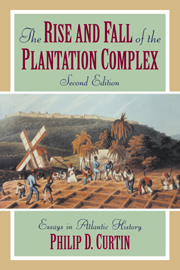Book contents
- Frontmatter
- Contents
- Preface
- Preface to first edition
- Beginnings
- Seventeenth-century transition
- Apogee and revolution
- 9 The slave trade and the West African economy in the eighteenth century
- 10 Atlantic commerce in the eighteenth century
- 11 The Democratic Revolution in the Atlantic basin
- 12 Revolution in the French Antilles
- Aftermath
- Appendix
- Index
9 - The slave trade and the West African economy in the eighteenth century
Published online by Cambridge University Press: 05 June 2012
- Frontmatter
- Contents
- Preface
- Preface to first edition
- Beginnings
- Seventeenth-century transition
- Apogee and revolution
- 9 The slave trade and the West African economy in the eighteenth century
- 10 Atlantic commerce in the eighteenth century
- 11 The Democratic Revolution in the Atlantic basin
- 12 Revolution in the French Antilles
- Aftermath
- Appendix
- Index
Summary
For twentieth-century North Americans, the Atlantic slave trade is hard to put in perspective. More Americans trace their ancestors to Africa than to any continent other than Europe, and it was the slave trade that brought them; but that phase of our past carries strong emotional overtones – for Afro-Americans and Euro-Americans alike. These feelings involve guilt, shame, and the attempt to assess blame for atrocities committed by people long since dead.
No one today defends the slave trade as a humane institution, and few indeed defend it on any grounds. It may be well to concede that the era of the slave trade is beyond the effective range of moral condemnation – and to try to find out what happened and why, rather than placing blame, however well deserved. The Atlantic slave trade grew to be the largest intercontinental migration up to its time. One way to begin is to see the trade as an economic enterprise.
Prices
Whatever else, the slave trade existed because West Indian, Brazilian, and other New World planters were willing and able to pay for them. The tropical American lowlands had been denuded of population, and economic development of any kind needed people. In the circumstances of the sixteenth, seventeenth, and eighteenth centuries, that population had to come from somewhere else, and that meant, in the first instance, either Europe, Africa, or American regions away from the plantation zone.
- Type
- Chapter
- Information
- The Rise and Fall of the Plantation ComplexEssays in Atlantic History, pp. 113 - 128Publisher: Cambridge University PressPrint publication year: 1998

